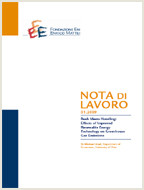Levelling the Playing Field: On the Missing Role of Network Externality in Designing Renewable Energy Technology Deployment Policies

Date
02.09.2015
02.09.2015
Authors
Wei Jin (School of Public Policy – Zhejiang University); ZhongXiang Zhang (College of Management and Economics – Tianjin University)
JEL Code
Q41, Q42, Q48, Q54, Q55, Q58, H23, O13
Q41, Q42, Q48, Q54, Q55, Q58, H23, O13
Keywords:
Renewable Energy Deployment, Energy Technology Adoption, Network Externality, Climate Technology Policies
Renewable Energy Deployment, Energy Technology Adoption, Network Externality, Climate Technology Policies
Publisher
Climate Change and Sustainable Development
Climate Change and Sustainable Development
Editor
Carlo Carraro
Carlo Carraro
In creating a level playing field that facilitates the deployment of renewable energy technology (RET), the traditional energy policy regime based on eliminating RET’s cost gaps versus fossil energy technology (FET) may be not sufficient. Building on an economic model of energy technology adoption that features network externality, this paper takes an explicit account of the potential importance of network externality in the design of RET adoption policies. We argue that as incumbent FET has established pervasive deployment and installed base advantages within the existing energy production, distribution and service network, it would create a network externality mechanism that makes it difficult to dislodge the dominant FET-based technological regime, leading to an inertia against the adoption of newly emerging RET even if energy policy regulations have been put in place to eliminate RET’s cost disadvantage. We hence propose that a reformulation of RET policy paradigm should consider extending the traditional scheme centring on eliminating cost gap to a new one that corrects for both cost and network externality gaps.
***
Suggested citation: Jin, W., Z. Zhang, (2015), ‘Levelling the Playing Field: On the Missing Role of Network Externality in Designing Renewable Energy Technology Deployment Policies’, Nota di Lavoro 76.2015, Milan, Italy: Fondazione Eni Enrico Mattei
